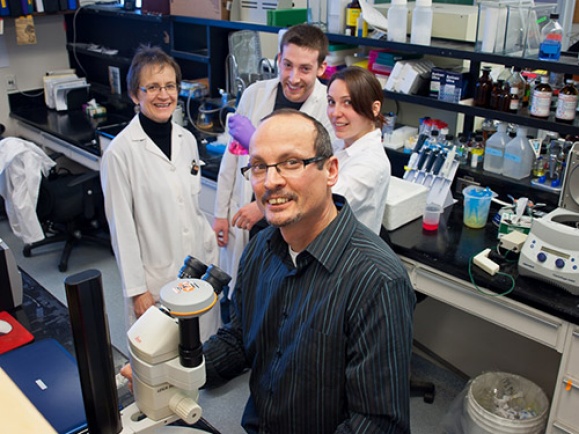News
» Go to news mainDr. Roger McLeod, Unravelling the mysteries of fat metabolism

Dr. Roger McLeod is exploring how some dietary fats encourage our bodies to store less fat, while others prompt us to hang on to fat – in the blood vessels and in deposits of adipose tissue. They do this in part, he says, through their effect on a key signalling protein called adiponectin, which is produced in the body’s healthy fat cells to regulate the storage of fats.
“We’ve learned that the healthiest fats – the omega-3 fatty acids found in such foods as fatty fish like Atlantic salmon – increase adiponectin levels in the bloodstream. This sends a signal to other tissues in the body to break down and eliminate fats instead of storing them,” says Dr. McLeod, professor in the Department of Biochemistry & Molecular Biology and assistant dean of research in the Faculty of Medicine. “At the opposite extreme, some trans fats like those found in hydrogenated vegetable oils make adiponectin levels drop – and as adiponectin levels go down, the rate of fat storage goes up.”
Dr. McLeod and his team are studying how adiponectin is produced and how it works in the body. In addition to its direct effects on fat storage, they’ve found that adiponectin also helps cells stay sensitive to insulin – so high levels can enable effective sugar metabolism, control fat storage and prevent type 2 diabetes.
Dietary fats are not the only agents that act on adiponectin. As Dr. McLeod and colleagues at Laval University have found, certain small pieces of proteins from fish – called peptides – can also affect fat storage and sugar metabolism. “Omega-3 fatty acids do not explain the full benefits of fish,” he notes. “As we’ve discovered, the protein in fish is just as important as the fat.”
The researchers are working on a method of extracting these fish proteins and turning them into a food supplement. “Ultimately, we would like to partner with a company in the fish processing industry, to recover fish proteins that currently go to waste and develop them into a powerfully beneficial health product,” Dr. McLeod says. “We see huge commercial potential and a great economic development opportunity for Nova Scotia.”
While adiponectin research occupies a great deal of Dr. McLeod’s time, it’s only part of the story in his busy research lab. He and his team are also studying a molecule known as apolipoprotein-B (apoB) that provides a protein vehicle for small fatty molecules to be carried in large low-density (bad) cholesterol particles.
“It all happens in the liver,” explains Dr. McLeod, who uses cell culture models to explore how the liver packages, breaks down and ships out various kinds of fats and proteins. He’s particularly interested in a structure that’s very active in liver cells called the proteasome, because it breaks down proteins – including apoB.
“If we can uncover the mechanism that marks apoB as a target for destruction by the proteosome, we could identify a small molecule that would encourage the proteasome to degrade more apoB,” he says. “This would reduce the amount of harmful cholesterol being released into the bloodstream, which in turn would reduce the risk of cardiovascular disease and stroke.”
Dr. Roger McLeod
Born: Vancouver, BC
Current Appointments:
Professor, Department of Biochemistry & Molecular Biology, Assistant Dean, Research, Faculty of Medicine
Education:
B.Sc., Biochemistry, University of British Columbia
Ph.D., Pathology, University of British Columbia
Post-doctoral Fellow, Biochemistry, University of Alberta
Post-doctoral Fellow, University of Ottawa Heart Institute
Research Team:
Dr. Vanessa DeClercq (PhD)(PDF)
Dr. Palanivel Rengasamy (PhD)(PDF)
Eric Fisher (PhD candidate)
Alexandra Reda (MSc candidate)
Debbie Currie (BSc)(research assistant)
Brandon d'Eon (BSc)(research assistant)
Allen Custance (honours student)
Elizabeth Lake (honours student)
Main Collaborators:
Dr. Jan Rainey (Biochemistry & Molecular Biology, Dalhousie)
Dr. Thomas Gill (Process Engineering, Dalhousie)
Dr. Andre Marette (Laval University)
Mentors:
I have had three important mentors who have helped me in my career. The first was Dr. Jiri Frohlich, who introduced me to clinical research and encouraged me to enter graduate school. The second was my Ph.D. supervisor, Dr. Haydn Pritchard, who showed me that training scientists often requires that you allow them to be creative and make mistakes. The third was my postdoctoral fellowship mentor, Dr. Zemin Yao, who reminded me how scientific rigour is difficult at times, but still imperative.
Main Inspiration:
Working at the bench still gives me a thrill! I enjoy being in the trenches with my trainees (whenever I can). I still think that important discoveries are often serendipitous and you have to be alert to recognize them when they happen.
Recent News
- New global study Highlights the Biological Roots of Anxiety
- Dalhousie and NCIME launch first‑of‑its‑kind program in Membertou First Nation
- A message from Wanda M. Costen, PhD, Provost and Vice President Academic
- Rhodes scholar Sierra Sparks returns home to study medicine
- President Kim Brooks, Dr. Pat Croskerry appointed to Order of Canada
- Dal’s Highly Cited Researchers reflect on influential global research alliances
- A New Bursary Supporting Black Medical Students at Dalhousie
- Dalhousie’s first physician assistant cohort steps into Nova Scotia’s healthcare system
